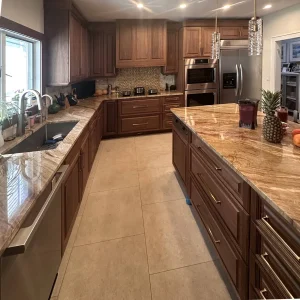 Smart technology is revolutionizing the way we interact with our homes, and the kitchen is no exception. With support from Abbey’s Custom Kitchen, Bathrooms & Interiors, homeowners can incorporate smart devices and systems to make kitchen tasks easier, boost energy savings, improve safety, and bring innovative features to daily cooking routines. So, let’s explore practical ways to incorporate smart technology into your kitchen, transforming it into a connected, efficient, and enjoyable space.
Smart technology is revolutionizing the way we interact with our homes, and the kitchen is no exception. With support from Abbey’s Custom Kitchen, Bathrooms & Interiors, homeowners can incorporate smart devices and systems to make kitchen tasks easier, boost energy savings, improve safety, and bring innovative features to daily cooking routines. So, let’s explore practical ways to incorporate smart technology into your kitchen, transforming it into a connected, efficient, and enjoyable space.
The cornerstone of a smart kitchen is its appliances. Modern smart refrigerators, ovens, dishwashers, and microwaves offer features such as remote monitoring, automated cooking functions, and energy usage tracking. For example, a smart refrigerator can notify you when groceries are running low or even help you plan meals based on its contents.
- Smart ovens can be preheated remotely or set to cook meals automatically according to preset recipes.
- Smart Refrigerator: Monitors inventory, suggests recipes, and enables remote temperature control.
- Smart Oven: Allows remote operation, voice control, and precise temperature settings.
- Smart Dishwasher: Schedules cycles during off-peak hours and notifies you when dishes are clean.
Devices such as Amazon Alexa, Google Assistant, or Apple HomeKit can be integrated into the kitchen to control appliances, set timers, play music, or provide recipe instructions hands-free. Connecting these assistants to your smart devices enables comprehensive automation—for example, turning on the coffee maker as part of your morning routine or dimming lights during dinner. Another aspect to consider is smart lighting systems. These allow you to adjust the brightness and color of kitchen lights via smartphone apps or voice commands. You can set scenes for different activities, such as cooking, dining, or entertaining, and automate lighting based on time of day or occupancy sensors. Smart faucets offer touchless controls, voice activation, and precise temperature adjustments, reducing the spread of germs and increasing convenience. Some systems monitor water usage and alert you to leaks, helping to conserve water and prevent damage. Smart smoke detectors, carbon monoxide sensors, and leak detectors enhance kitchen safety by providing real-time alerts to your smartphone. Automated shut-off valves can prevent water damage from leaks, while security cameras integrated into the kitchen offer peace of mind. Smart plugs and energy monitors help track and optimize the power consumption of kitchen devices. Scheduling appliances to run during off-peak hours or remotely powering them off reduces energy bills and environmental impact.
Innovative storage solutions include cabinets with integrated sensors to track inventory or expiration dates, and smart trash cans that notify you when they need to be emptied. These systems help maintain organization and reduce food waste. When incorporating smart technology, consider compatibility between devices and the overall ecosystem you wish to build. Many manufacturers offer products that work together seamlessly, while others require third-party hubs or apps for integration. Begin with the most impactful upgrades—such as smart lighting or appliances—and expand over time as needs and budgets allow. Abbey’s will provide all the support you need to ensure that all technology remains fully compatible.
Incorporating smart technology into your kitchen not only adds convenience and efficiency but also enhances safety and sustainability. By thoughtfully selecting and integrating smart devices, you can create a kitchen that adapts to your lifestyle and makes everyday tasks simpler and more enjoyable. At Abbey’s Custom Kitchen, Bathroom & Interiors, we assist you in making these choices so you can avoid unnecessary stress over the details. Reach out today to book an appointment and discover how we can modernize your kitchen or bathroom with state-of-the-art solutions.
